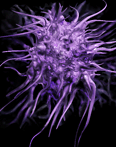Aphanizomenon flos-aquae (AFA) & Natural Killer (NK) Cell Release
Health Professionals Research Royal Victoria Hospital
 Health Professionals Research
Health Professionals ResearchStudy of Chlorophyll
Effect of dietary chlorophyll derivatives on mutagenesis and tumor cell growth
Chernomorsky S, Segelman A, Poretz RD. (1999). Teratog Carcinog Mutagen.19(5):313-22
Much attention in recent years has been given to the antigenotoxicity of chlorophyll. Chlorophyll, however, is known to be converted into pheophytin, pyropheophytin, and pheophorbide in processed vegetable food and following ingestion by humans. Studies were conducted on the antimutagenic and tumoricidal potencies of these compounds. All the chlorophyll derivatives tested exhibit identical antimutagenic effect towards 3-methylcholanthrene (3-MC), suggesting that the porphyrin nucleus may complex directly with the mutagen. It does not exclude, however, another mechanism of activity involving inactivation the enzymatic transformation of 3-MC. In contrast, the action of N’-nitro-N’-nitrosoguanidine (MNNG) depends upon structural differences between the chlorophyll derivatives. It is significantly lower when the phytol-containing pheophytin and pyropheophytin are tested as to that of the phytol-lacking pheophorbide. The higher concentrations of the chlorophyll derivatives were required to reduce the mutagenicity of MNNG than needed for 3-MC. The cytotoxicity of chlorophyll derivatives against tumor cells also was evaluated. The cellular uptake and inhibition of myeloma cell multiplicity were found to be greater for pheophorbide than for pheophytin. Calculated on the amount of cell associated chlorophyll derivative, however, pheophytin was more cytostatic/cytotoxic than pheophorbide. The results presented in this report indicate that food sources that yield chlorophyll derivatives may play a significant role in cancer prevention.
An Exciting New Discovery!
Recently the first stage of an extensive research project carried out at the Royal Victoria Hospital in Montreal, Canada produced some remarkable results. The project studies the effect of Aphanizomenon flos-aquae on the immune and endocrine systems, as well as on general blood physiology. It was discovered that eating AFA had a profound and unique effect on Natural Killer (NK) cells. The results were recently published under the title: Effects of the Blue Green Algae Aphanizomenon flos-aquae on Human Natural Killer Cells. It appears in Chapter 3.1 of the IBC Library Series, Volume 1911, Phytoceuticals: Examining the health benefit and pharmaceutical properties of natural antioxidants and phytochemicals.
NK cells have the ability to search for and recognize cells that are cancerous or have been infected by a virus, and kill them. The team of research scientists at the Royal Victoria Hospital, led by Dr. Gitte S. Jensen, discovered that eating Aphanizomenon flos-aquae triggers the movement of 40% of the circulating NK cells from the blood to the tissues where their main function is to perform immune surveillance and eliminate cancerous and virally-infected cells. Further research may prove that eating a small amount of AFA every day could assist in the prevention of cancer and viral infections. No other substance is known to trigger such a movement of NK cells in the body. This is very exciting news! We hope you will share it with everyone you know!_____________________________________________________
NOTE: These statements have not been evaluated by the U.S. Food &
Drug Administration. The information contained in this website, are not
intended to treat, cure or prevent any disease. Results may vary.
on May 16, 2009 on 4:25 pm
[…] Aphanizomenon flos-aquae (AFA) & Natural Killer (NK) Cell Release This post was written by SuperFoodie on May 16, 2009 Posted Under: Superfood Talk Aphanizomenon flos-aquae (AFA) & Natural Killer (NK) Cell Release […]
on October 16, 2009 on 8:52 am
[…] Aphanizomenon flos-aquae (AFA) & Natural Killer (NK) Cell Release Health Professionals Research Royal Victoria Hospital Health Professionals Research Study of ChloropTags: afa, aphanizomenon, aquae, chlorop, flos, health, hospital, killer, natural, professionals, release, research, royal, victoria Categories: Superfood Experts Tags: Comments (0) Trackbacks (0) Leave a comment Trackback […]